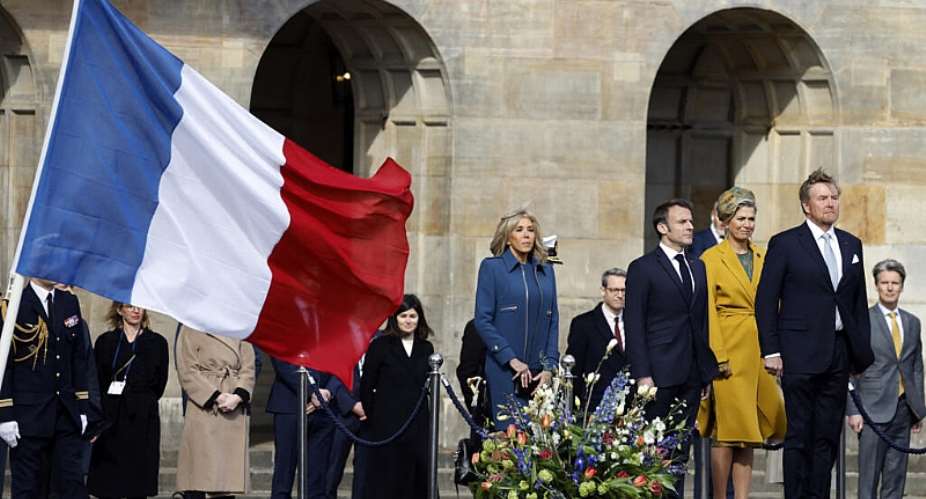French President Emmanuel Macron began a state visit to the Netherlands on Tuesday by delivering a key-note speech on "European sovereignty" at the Nexus Institute in The Hague.
Macron outlined his ideas for the future of the EU, elaborating on his flagship "plan for Europe " first presented in 2017 at the Sorbonne University in Paris.
The plan contains six "keys" to European sovereignty, including a common defence budget, streamlining immigration and asylum procedures, and developing a new partnership with Africa. Europe should allign social and fiscal policies, and strengthen democracy by promoting national and local debate.
Macron thinks the EU has to change and can no longer afford to continue its old policies in the face of the US, and the growing cooperation between Russia and China.
Royal welcome, and hecklers
Making the first state visit by a French president to the Netherlands for 23 years, Macron and his wife Brigitte were greeted by Dutch King Willem-Alexander and Queen Maxima on their arrival in Amsterdam.
The French leader stood to attention outside the Royal Palace as a band played the Marseillaise, the French national anthem. He later laid a wreath at the Dutch National Monument.
In the afternoon, Macron spoke to an audience of international students about "the future of Europe", an event organised by the Nexus Institute, marking the 75th anniversary of the Congress of Europe, which was held in The Hague in March 1948, and which planted the seeds of what was to become the European Union.
Before Macron could begin, he was interrupted by hecklers in the auditorium carrying slogans like "President of violence and hypocrisy" and screaming "Where is French democracy?"
"I can answer this question if you give me some time," Macron calmly replied while security personnel removed the protesters.
Outside the venue, a handful of students also organised a small protest against Macron's pension reforms in solidarity with demonstrators in France. They called on people to shout slogans such as "Against against against 49,3, what we want is democracy."
Conference organisers warned that "no form of burning will take place, such as the burning of photos, flags and/or dolls," while demonstrators were asked not to wear face masks, helmets or balaclavas or take "objects that are usually used in the event of disorder, such as chains and bats."
Macron's speech in The Hague was preceded by controversy over remarks on Europe and China the French leader made over the weekend.
In an interview with Politico and Les Echos last Sunday, Macron said that the EU should reduce its dependency on the United States and avoid getting dragged into a confrontation between China and the US over Taiwan, underlining the importance of the EU's “strategic autonomy”.
With these ideas, Macron in fact submits to the post cold-war joint declaration by China and Russia on the "multipolar world and the establishment of a new international order." The document declared the cold war and the bipolar system to be outdated. That document calls "not for hegemony and power politics, but for dialogue and cooperation." Macron wants Europe to become a third pole, facing the US and the Russia/China alliance.
Sharp criticism
But Macron's European dream, and his attitude to the standoff between Beijing and Washington over Taiwan, have already generated sharp criticism.
The influential Wall Street Journal writes that Macron has blundered and is undermining US-led deterrence against China.
Paris daily Le Figaro wonders if Emmanuel Macron is not repeating with Xi Jinping on the question of Taiwan the error the French president made with Vladimir Putin just before the Russian invasion of Ukraine.
Emmanuel Macron has completely misunderstood the situation, says political analyst Antoine Bondaz. Macron "puts all the blame for the tension on the United States," according to Bondaz, "forgetting that China's ambition is to take control of Taiwan, destabilise the global order."
US Senator Marco Rubio said on Twitter that "we need to find out if Emmanuel Macron speaks for Europe".
And director of the Polish Institute of International Relations (PISM), Slawomir Debski remarked that "a brain death has occurred somewhere, no doubt," referring to the words used by the French president to describe NATO in 2019.
- Controversy continues on both sides of the Atlantic over Macron's remarks about US, China
- Macron says EU must follow its own course, avoid getting caught up in Taiwan issue
Upon his return to France on Wednesday evening, Macron will face another day of national strikes. On Friday, the Constitutional Court will decide on the legality of the proposed pension reforms.





 Cecilia Abena Dapaah’s husband details monies stolen by house helps
Cecilia Abena Dapaah’s husband details monies stolen by house helps
 We didn’t exonerate Cecilia Abena Dapaah – OSP debunks AG’s claim
We didn’t exonerate Cecilia Abena Dapaah – OSP debunks AG’s claim
 SHS/SHTS students granted 4-day permission to partake in limited voter registrat...
SHS/SHTS students granted 4-day permission to partake in limited voter registrat...
 Businesses running away from Ghana due to ‘dumsor’, high cost of electricity – B...
Businesses running away from Ghana due to ‘dumsor’, high cost of electricity – B...
 ‘If 2024 elections are held today, Bawumia will win all regions except Volta’ — ...
‘If 2024 elections are held today, Bawumia will win all regions except Volta’ — ...
 IMANI petitions CHRAJ to investigate EC over premature retirement, disposal of l...
IMANI petitions CHRAJ to investigate EC over premature retirement, disposal of l...
 Exercise fiscal restraint to preserve sound public finances in this ‘great elect...
Exercise fiscal restraint to preserve sound public finances in this ‘great elect...
 Uncomfortable economic indicators driving multinational companies out of Ghana –...
Uncomfortable economic indicators driving multinational companies out of Ghana –...
 You whine too much; focus and exercise your powers – Sammy Gyamfi to Kissi Agyeb...
You whine too much; focus and exercise your powers – Sammy Gyamfi to Kissi Agyeb...
 Limited voter registration: GES grants 18-year-old SHS/SHTS students 4-day permi...
Limited voter registration: GES grants 18-year-old SHS/SHTS students 4-day permi...
